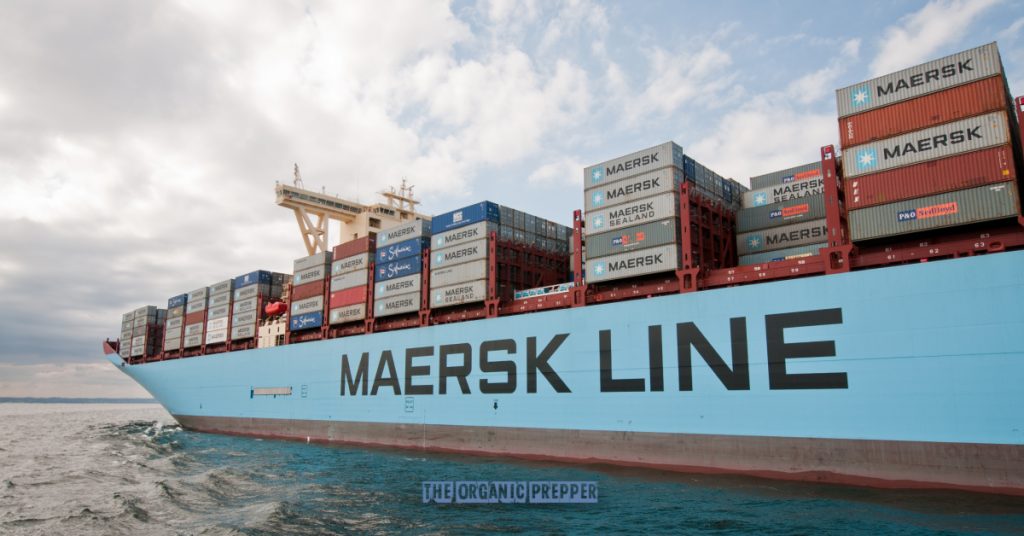by Daisy Luther, The Organic Prepper:

Last weekend was an eventful one in the Red Sea. Houthi rebel groups have been mercilessly attacking commercial vessels using the passage with drones, and now they’ve upped their game by directly attacking a Maersk cargo ship with missiles and attempting to board, despite the Pentagon rolling out “Operation Prosperity Guardian.”
This is a conflict that could directly affect us by increasing consumer prices for fuel and goods. Let me explain.
TRUTH LIVES on at https://sgtreport.tv/
What happened to the Maersk ship?
The Maersk Hangzhou was sailing through the normal route on the Red Sea when on Dec. 30, they were attacked by multiple Houthi missiles and hit by one. American naval ships, the USS Laboon and the USS Gravely, responded to distress calls. Gravely intercepted two missiles meant for the ship.
The following day, the situation grew more dire when the Houthi group got bolder. A squadron of four armed boats came within 20 yards of the Maersk ship and attempted to board. They were held off by on-ship security contractors. This time, helicopters from the USS Dwight D. Eisenhower and the USS Gravely responded to the distress call and were engaged by the Houthi. The helicopters returned fire and downed three of the four attacking ships. Ten Houthi crew members died in the attack, and the fourth ship escaped.
Maersk has paused operations in the Red Sea for 48 hours and will decide today whether or not they’ll resume use of that route. Other shipping companies, Hapag-Lloyd, MSC Mediterranean Shipping Company, and Evergreen, have already rerouted their cargo around Africa. BP and Euronav have also suspended passage through the Red Sea.
Now Iran is getting involved.
A spokesperson for the Houthi group has warned of “consequences and repercussions” due to the “aggression” of the US. ZeroHedge reports:
Houthi military spokesman Yahya Sarea confirmed on the Yemeni TV channel Al-Masirah that US forces killed ten of its fighters.
“US enemy forces attacked three boats belonging to the Yemeni Naval Forces, which led to the martyrdom and the loss of ten people from the Naval Forces,” Sarea said.
The spokesman said its fighters were “performing their humanitarian and moral duty” to deter Israel-related commercial vessels from transiting the Red Sea “in solidarity and support for the Palestinian people.”
Subsequently, Iran has dispatched the Alborz destroyer to the Red Sea to provide support for the Houthi. This seems to be a significant escalation and direct challenge to the American naval presence in the area.
When are we going to admit we’re at war?
Here’s how all this affects us.
Why should we care about the Red Sea? Isn’t that just a Middle East problem? Don’t we need to stay out of it?
It’s not that simple, really.
It’s a huge route for global trade. The Hill reports:
The Red Sea is a major shipping lane route, facilitating roughly 10 percent of the world’s commerce each year.
Sailing through the Suez Canal and down the Red Sea and Gulf of Aden offers a shortcut connecting Europe to Asia and the Pacific region; it is used by about one-third of global shipping companies.
Rerouting all the way around Africa adds some 3,000 nautical miles and up to two weeks of travel, and shipping companies are now adding the extra costs as a transit disruption surcharge or a war risk surcharge, as referred to by Israeli shipping company ZIM.
“Diverting vessels around the Cape of Good Hope to mitigate the ongoing risks of sailing through the region is a necessary step in the interest of safety, but it has ultimately brought about increased costs for carriers,” said Danish shipping giant Maersk in an advisory.
The reroutes affect 17 percent of global shipping traffic, and cargo costs for carriers are expected to soar 15 to 20 percent, according to the American Journal of Transportation.
So, our prices have already skyrocketed, and now the transportation to get things like oil and merchandise to the US are going to go up by 15-20%.
Read More @ TheOrganicPrepper.ca




